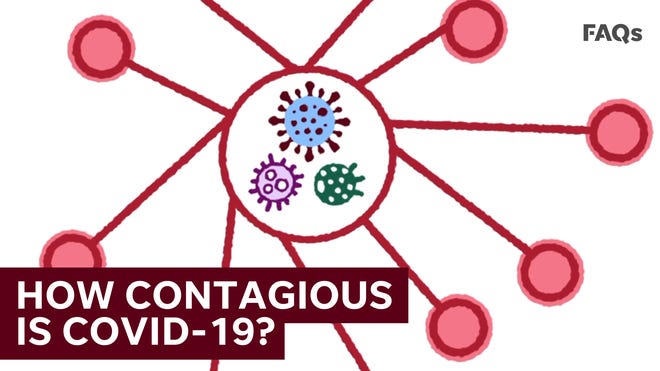
Texas Gov. Greg Abbott's announcement that he is dropping all mask mandates and business restrictions effective March 10 is fueling controversy in the Lone Star state.
Dr. Mark McClellan, a former head of the Food and Drug Administration who the Abbott administration has consulted in the past, said he had no input.
"I don't think this is the right time," McClellan said. "Texas has been making some real progress but it's too soon for full reopening and to stop masking around others."
Houston Police Chief Art Acevedo described Abbott's ambitious plan as "grossly misguided," but said it will provide residents an opportunity to see "who among us cares enough about their fellow Texans to follow simple steps to protect our fellow Texans from a deadly virus."
Abbott is fully vaccinated. Angela Clendenin, an epidemiologist at the Texas A&M University School of Public Health, said it would have been better to wait until all Texans have an opportunity to be vaccinated. Now, she said the onus is on individuals to protect one another to avoid a "free-for-all.”
Meanwhile, Mississippi Gov. Tate Reeves issued similar order, and the tandem decisions this week prompted President Joe Biden to slam the "neanderthal thinking" of rolling back coronavirus restrictions when only about 8% of the U.S. population is fully vaccinated.
Abbott's plan did draw support from Dr. John Hellerstedt, commissioner of the state Department of State Health Services, who said the governor’s decision was not a threat to public safety. Hellerstedt said he believes Texans should wear masks but should not be ordered to do so.
Also in the news:
►A first: The U.S. administered an average of more than 2 million vaccine doses a day over the seven-day period that ended Wednesday, based on a USA TODAY review of data from the Centers for Disease Control and Prevention.
► Health officials in Hillsborough County, Florida, have determined that official events around Super Bowl 55 resulted in 57 total COVID-19 cases, despite the thousands of fans who traveled to Tampa to attend the game and surrounding events.
► New York, one of the first states in the U.S. to implement travel restrictions on domestic visitors last spring, took another step toward relaxing its COVID-19 policies Wednesday by lifting the quarantine and COVID-19 testing restrictions on people who have been vaccinated within 90 days of their second inoculation.
► An outbreak of COVID-19 at the Vermont state prison in Newport has grown to 100 inmates and eight staff members, the commissioner of the Department of Corrections said.
? Today's numbers: The U.S. has more than 28.7 million confirmed coronavirus cases and 518,300 deaths, according to Johns Hopkins University data. The global totals: More than 115.12 million cases and 2.55 million deaths. More than 107 million vaccine doses have been distributed in the U.S. and about 80 million have been administered, according to the CDC.
? What we're reading: Four states have announced rolling back mask mandates in major recalls of COVID-19 safety measures over the last month — leaving many to wonder whether additional states will join the tide and alter how the country is dealing with COVID-19 at a crucial moment in the fight against the disease. Read the full story.
USA TODAY is tracking COVID-19 news. Keep refreshing this page for the latest updates. Want more? Sign up for our Coronavirus Watch newsletter for updates to your inbox and join our Facebook group.
Actual cost of $1.9 trillion stimulus plan remains a mystery
Senators were awaiting a final price tag on President Joe Biden's COVID stimulus plan Thursday before starting debate on the measure Democrats are eager to pass by the end of next week. The Senate had been set to begin debate Wednesday on the legislation, but the Senate was still waiting for the nonpartisan Congressional Budget Office and the Congressional Joint Committee on Taxation to estimate the total cost of the Senate version of the bill, according to a senior Democratic aide speaking on condition of anonymity. By rule the total cost must come in under the $1.9 trillion authorized in previous legislation.
– Nicholas Wu
It's not just Texas: Pressure builds to ease restrictions
Texas and Mississippi aren't the only states rolling back mask mandates and other safety measures. Texas, Montana, New York and Arkansas are among states rapidly easing restrictions. More states could join the tide, altering how the country is dealing with COVID-19 at a crucial moment in the pandemic. Meanwhile, cities, businesses, and families are often making their own choices of whether to wear masks or go to restaurants, despite what governors say. Eric Rubin, an infectious diseases specialist at the Harvard T.H. Chan School of Public Health, said he understood the daunting task for states desperate to reopen their economies. But that, he says, has nothing to do with wearing a mask.
"The part that doesn't make any sense at all is the masking part," Rubin said. "There's no economic reason to not wear masks ever."
– Christal Hayes
Iconic civil rights march in Selma will be virtual this year
For the first time in decades, there will be no crowds walking streets in Selma, Alabama, or politicians linking arms at the base of Edmund Pettus Bridge during the first weekend in March.
Amid the ongoing coronavirus pandemic, the Selma Bridge Crossing Jubilee is going virtual, streaming speeches, workshops and fellowship into homes across the nation and around the world. The 2021 Jubilee marks the 56th anniversary of the Bloody Sunday march, in which hundreds of civil rights protesters attempted to march from Selma to Montgomery on March 7, 1965.
"We realized in September there was still going to be a very real threat to public health and safety," said Drew Glover, principal coordinator for the 2021 event. "We took a step back and asked ourselves about what would be the best approach to still have the event and keep people as safe as possible."
– Melissa Brown, Montgomery Advertiser
Arizona governor orders all schools to open classrooms
Arizona Gov. Doug Ducey has ordered all schools must return to in-person learning this month, saying "students need to be back in the classroom."
Ducey issued an executive order Wednesday that calls for all schools to reopen in-person learning by March 15, or after spring break. The move comes about a year after schools initially closed in-person classes to help limit the spread of COVID-19. Some states have similar plans to welcome back students, including California, Michigan and North Carolina.
President Joe Biden's American Rescue Plan, the $1.9 trillion economic stimulus package being debated in the Senate, has about $130 billion included for schools to give them the resources to reopen safely amid the pandemic. Many states are now vaccinating teachers in an effort to get them back into classrooms as soon as possible.
– Rachel Leingang, Arizona Republic
Fewer low-income students heading for college as pandemic takes toll
Applying to college has always been harder for first-generation and low-income students than for peers with greater access to support at every step of the process. This year, data shows, that gulf has widened. The pandemic is a likely culprit.
Overall completion of the federal financial aid form, a harbinger of college-going intent, was 9.2% behind the prior year on Feb. 19. In high schools serving lower-income students, it lagged 12.1%, and in schools with a high percentage of students of color, the decline was 14.6%.
"What we are really worried about, simply put, is: 'will we miss out on an entire generation of students going to college?'" said Angel Pérez, CEO of the National Association for College Admission Counseling. “If the pandemic has highlighted anything” about admissions, he said, it is “how the system perpetuates inequality” and how complex applying has become.
– Laura Pappano, The Hechinger Report
Hurdles remain as vaccine makers scramble to meet delivery dates
As vaccine experts welcomed President Joe Biden's accelerated timeline for distribution, they offered some caution about whether the companies can reach their promised doses and delivery dates.
While there's never 100% certainty in manufacturing, pharmaceutical manufacturing is especially finicky and demanding. People like to think making vaccines is like making widgets or automobiles but it’s not, said Robert Van Exan, president of Immunization Policy and Knowledge Translation, a vaccine production consulting firm.
“You can be going along and getting a certain yield and then all of the sudden your yield drops and you don’t know why," Van Exan said. "Test delays or failures, raw material supply chain, lot failures and yield problems are just some of the examples of things that can result in supply disruptions."
– Elizabeth Weise
Starbucks, Target among retailers that will still require masks in Texas
Even as some states roll back mask mandates, some of the nation’s largest retailers including Kroger, Macy’s, Starbucks and Target are not rolling back theirs.
Kroger, which also owns supermarket chains including Ralphs and Dillons, said in a statement to USA TODAY that it will "continue to require everyone in our stores across the country to wear masks until all our frontline grocery associates can receive the COVID-19 vaccine." Best Buy also told USA TODAY it had no plans to change its mask policy.
Texas Gov. Greg Abbott's decision to lift the face covering requirement and "open Texas 100%" to full capacity on March 10 conflict with safety protocols at many businesses. Read more here.
– Jessica Guynn
What to know about COVID variants spreading throughout the country
Health officials are urging Americans to not let their guards down against COVID-19 as researchers discover new variants that may already be more transmissible and could also be somewhat resistant to the vaccine. “At this level of cases, with variants spreading, we stand to completely lose the hard-earned ground we have gained,” Centers for Disease Control and Prevention director Dr. Rochelle Walensky said during a White House briefing Monday. “These variants are a very real threat to our people and our progress.”
While experts have been following variants first identified in the United Kingdom and South Africa, they're also seeing red flags in newer variants discovered in Brazil, New York and California. Find out what you should know about the variants.
– Adriana Rodriguez
Contributing: Mike Stucka, USA TODAY; Nicole Cobler, Austin American-Statesman; The Associated Press
Source link







